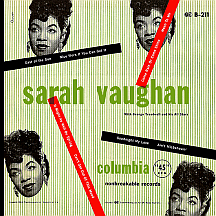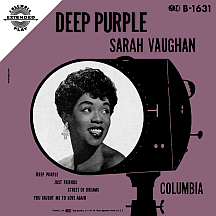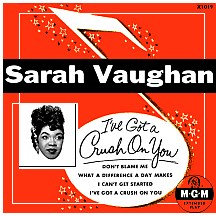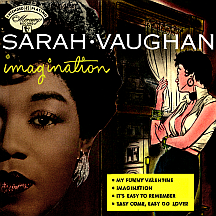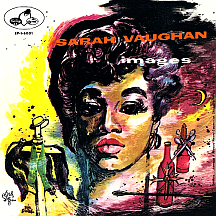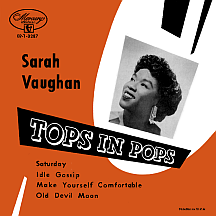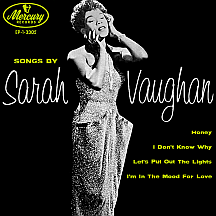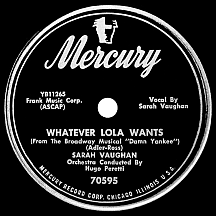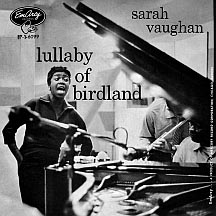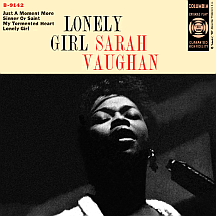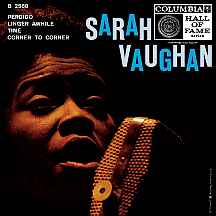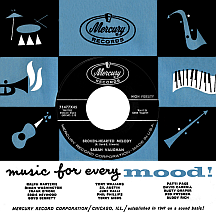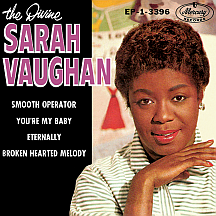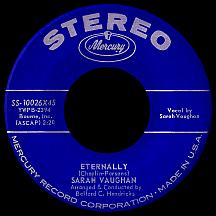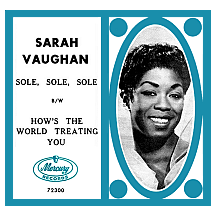SARAH VAUGHAN
It mattered little how "Sassy" spent her free time or, for that matter, what she did on her breaks between sets performing in nightclubs. Anytime a microphone appeared in front of her, the upshot was sheer elation for anyone within earshot. She had her cigarettes...two packs a day for decades. Booze...one drink after another as necessary to get her through a long night of socializing. Drugs...the over-the-counter kind or their stronger counterparts, higher doses as time went by. Boyfriends, husbands, no shortage over the years...getting slapped around on a regular basis didn't keep her from performing at the highest level, always in complete control of the alto, contralto and even soprano registers. I don't know how she pulled it off, how her vocal cords held up for decades with little or no deterioration, in her case a normal maturing of sound, a richness of tone and delivery every bit as appealing as in her youth (except by way of preference for the types of material she selected or was given). But you know the saying: some got it, some don't. Sarah Vaughan was one of the music world's wonders.
Performing for audiences was her best high, and she had an ability to do it well at any time, under any circumstance. Since no one can be on stage 24 hours a day, it may just mean her many vices, to some degree, served as gap-fillers between performances. When it came to recording in the studio, she figured out quite early that she functioned best when coming off a late-night binge of club-hopping, partying, using others or abusing herself. The more mashed-up she felt, the better the end result seemed to be (it should be noted that she excelled at "maintaining" in professional situations). At some point she started using cocaine, a habit that seemed impossible to shake, even after many years. It's an "ugly" side of Sarah I'm not entirely comfortable pointing out, but this isn't meant as harsh criticism. Amazingly, these personal demons didn't diminish her greatness as an artist. I've been caught up in Sarah's spell for most of my life, well aware I'm standing in line behind millions who were hooked before me.
Her parents, Asbury "Jake" Vaughan and wife Ada, had settled in Newark, New Jersey several years before Sarah's birth in 1924. They owned a piano and their daughter gravitated toward it. Though never formally trained, she studied music and learned to sing on her own (self-teaching a talent in itself), a challenge taken seriously for several years leading up to age 18; at that point any reasonable degree of discipline didn't seem necessary. The family attended the Mount Zion Baptist Church, where she sang in the choir and later played organ. The first time Sarah sang somewhere outside the Lord's house, it was at the Apollo in Harlem, competing in the theater's famous amateur contest in October 1942 and taking first place, which included a mini-contract for a week of paid performances. Mom and Pop didn't approve!
In the spring of 1943 she did her week at the Apollo, grabbing the attention of Billy Eckstine, who then had his bandleader, piano great Earl "Fatha" Hines, check her out. Despite a casual, unkempt appearance, her natural ability was all that mattered to them. Hines hired her and suddenly the 19-year-old Sarah found herself traveling in buses with an all-male band whose members quickly discovered she could drink, smoke and swear with the best of them. Fatha's band had some of the hottest up-and-coming musicians of the day; two of them, trumpeter Dizzy Gillespie and saxophonist Charlie "Bird" Parker, would presently be among the most celebrated of all jazz practitioners. Back at home, her parents prayed their daughter would not be corrupted by this new lifestyle; for Sarah, it was just what she'd always dreamed about. In '44, Diz, Bird and Sarah defected with Eckstine when he started his own band, but within months she decided to venture forth alone. She sang and played piano for any nightclub that would hire her...and there were plenty.
Dizzy had introduced her to British-born songwriter-musician Leonard Feather, who helped get her in the door at the small Continental Records, where she made her first recordings, including Feather's "Signing Off," on the final day of 1944. A few months later, "Lover Man Oh Where Can You Be" (composed by Roger Ramirez, Jimmy Davis and James Sherman, it became one of Billie Holiday's signature songs) was covered by Gillespie for the Guild label with Sarah doing the vocal. Then Musicraft Records offered her a three-year deal. She made her first recordings for the New York-based company in May 1946, though it took more than a year before anything caught on. She met George Treadwell (who'd played trumpet for several bands including Cootie Williams' and Lucky Millinder's outfits) while performing at N.Y.'s Cafe Society nightclub; in September business and pleasure mixed, for better or worse, when they were wed (after obtaining a marriage license, of course) and he became her manager (no paperwork there - he just handled all the money).
Her records started selling better after about a year, starting with "Tenderly," an early version of the Walter Gross-Jack Lawrence song that every singer and bandleader seemed to have among their repertoire the next couple of decades. In 1948 she covered Nat "King" Cole's chart-topping "Nature Boy" and had her biggest hit of the decade with Sammy Cahn and Jule Styne's "It's Magic" (Richard Maltby led the orchestra), competing with several other versions including Doris Day's original from the musical Romance on the High Seas, Miss Day's debut feature film. By this time, demand for Sarah as a live act was stronger than ever; she performed ten or eleven months each year in the late '40s and early '50s at considerably higher rates. Treadwell, who'd stopped working as a musician to concentrate on his wife's career, wrangled deals that had her bringing in over 100 thousand dollars a year, though how much, or little, Sarah actually received, or even knew about, is the subject of much debate.
Moving in a pop direction didn't seem to bother the jazz purists; Sarah won several Down Beat magazine awards in the late '40s and '50s. Top Chicago disc jockey Dave Garroway (who became famous nationwide starting in 1952 as the original host of The Today Show on NBC-TV) was a huge fan of Sarah and often promoted her on his radio show. He came up with a nickname that caught on: "The Divine One." Sarah referred to Garroway's enthusiasm as "...the kind of support you can't pay for." When Musicraft began having financial difficulties around 1949, she signed with Columbia and scored a hit right away with Joe Lipman's fabulously moody arrangement of "Black Coffee," a song penned by Sonny Burke and Paul Francis Webster that had been recorded while she was still at Musicraft.
As her string of hits took shape with "Our Very Own" and a bigger production number than usual, "I Love the Guy," both arranged and conducted by Norman Leyden (who'd worked closely with Glenn Miller during World War II), pretense went out the window where her marriage was concerned. Shouting matches had been a daily routine for the Treadwells for some time; it got really nasty when George began accusing her of infidelity, wrongly at first. But eventually, as the marriage crumbled, each had relationships on the side. Yet throughout several more years of turmoil, one thing remained constant: George kept right on managing Sarah's career.
In 1951, she worked with Percy Faith (just prior to his own chart-topping success with "Delicado") on "These Things I Offer You (For a Lifetime)" and "I Ran All the Way Home," as her formidable contralto emerged more strong and sure while an affecting vibrato set her apart from all comers (but did she sometimes rely on it too much?). Her strongest effort that year was, perhaps, "Vanity," a Jack Manus-Bernard Bierman-Guy Wood ballad more closely associated with Texas-born pop singer Don Cherry; Sarah's rendition with seasoned bandleader Paul Weston still delivers chills.
Hitting the charts regularly with a succession of pop tunes was all fine and good, but Sarah was becoming frustrated by the limited opportunity to tackle jazz material, preferring not to confine her first love strictly to live shows. At the end of her contract with Columbia in 1954, she signed with Chicago-based Mercury Records, obtaining an enviable double-layered deal few at the time would have thought possible: pop songs designed to sell records would appear on Mercury, while her output for subsidiary label EmArcy would be jazz (or whatever she felt like doing), giving little concern to commercial potential. Her music hadn't always stayed within jazz or pop boundaries anyway, and from here on out she would be able to combine any influences she cared to, like for starters gospel and classical music.
The first Newport Jazz Festival, masterminded by obsessive jazz aficionado George Wein, was held in Rhode Island in July of '54 with Sarah Vaughan as one of its headliners. Within a few years the event drew everyone who was anyone in the world of jazz; Sarah appeared nearly every year over the next few decades. In December she assembled a hot band for her first EmArcy session. "Lullaby of Birdland," the "theme song" for Manhattan's Birdland nightclub composed by George Shearing and George David Weiss, had already been recorded by some of the era's best including Erroll Garner and Ella Fitzgerald. Sassy's version spent four minutes going through its paces with a top-flight lineup (trumpeter Clifford Brown, tenor saxophonist Paul Quinichette, flutist Herbie Mann, pianist Jimmy Jones, bassist Joe Benjamin and drummer Roy Haynes, all taking solo turns), becoming a classic in the process.
The early Mercury sessions were produced by Bob Shad and Hal Mooney, the latter also working with Dinah Washington (who'd built a considerable track record during her eight years since signing with Mercury, leading to what some observed as an in-house rivalry between "The Queen of the Blues" and "The Divine One"). Hits came immediately for Vaughan; her sultry reading of Bob Merrill's "Make Yourself Comfortable" reclined in the nation's top ten for several weeks in January and February 1955, prompting a strangely explanatory parody version by Andy Griffith that reached the top 30. A couple of months later, her string-heavy recording of Weiss and Bennie Benjamin's "How Important Can it Be?" trailed Joni James' version on its way up the charts, though both were major hits.
The Broadway musical Damn Yankees (with music by Richard Adler and Jerry Ross) was the source of one of Sarah's most popular hits, her sultry act going into overdrive in a way even the stage show's star, Gwen Verdon, would have difficulty equaling. "Whatever Lola Wants" ('...Lola gets,' as everyone knows!), went top ten in May, just after the show had opened to strong reviews and standing-room-only crowds (Dinah Shore also had success with a cover of the song). Seldom did Sarah have a song all to herself at the time of release; "Mr. Wonderful" (the title tune from the Broadway musical starring Sammy Davis Jr.) faced competition from Peggy Lee and Boston-born singer Teddi King; all three versions were top 40 hits.
Jazz critics, not particularly enamored of Vaughan's pop hits, generally gave her glowing reviews, some citing her as one of the greatest singers who ever lived (though their comments basically referenced her more nuanced jazz work). Regardless, this was a period of greatly increased exposure for Sarah, the frequent radio play that came as a result of her string of top 40 discs leading to greater demand and increased earnings. "Fabulous Character," the unusual calypso cover of "The Banana Boat Song" and one of her best vocals on Mooney's deftly-arranged "Leave it to Love" kept her going strong through '56 and '57. Reteaming with her mentor and early supporter Billy Eckstine resulted in a notable mid-'57 duet, "Passing Strangers." The lifelong friends collaborated several more times throughout the years.
George and Sarah Treadwell were finally divorced in 1958 after years of constant, and often decibel-bursting, arguments. When the financial aspect of their union became an issue it was revealed, not surprisingly, that George had exercised complete control. Several thousand dollars was all she ended up with, despite earnings estimates for the previous decade, counting royalties on record sales and, more significantly, live performances (of which amounts paid were often reported in the press as being in the two to three thousand range per week). The total would likely be no less than two million dollars; most of that time, Treadwell had given her an allowance of 350 a week. Trusting him as a manager had backfired. She'd learned an important lesson...or had she?
Sarah didn't waste much time in finding a replacement. She married cab company owner Clyde B. Atkins in September 1958. He took the reins as her new manager, despite having no experience along those lines; seems the familiar way of doing business, right or wrong, was all Sarah knew, only this time she kept a closer eye on how he went about it. She had recorded a break-up song, "Separate Ways," with arranger Ray Ellis, in January 1958...right in the middle of divorce proceedings. It was released as a single more than a year later. She didn't enter a recording studio for nearly a year, from September '58 to September '59, but during this time a single from the "Separate Ways" session passed the million mark, becoming the best-selling record of her career. "Broken-Hearted Melody," written by Hal David and Sherman Edwards, had longing lyrics ('Once you were our song of love...now you just keep taunting me...with the memory of his tender love') delivered in a bright, energetic way (reflecting the not-so-sad side of heartbreak?). As a "Pick to Click" on the hundreds of top 40 stations that had cropped up across the nation in the previous year or so, it reached the largest possible audience, spending all of September in the top ten. The B side (which should have been a separate A side), Erroll Garner's "Misty," didn't do badly either and is considered (along with Johnny Mathis's famous version) one of the two or three greatest recordings of the classic tune.
By the time she returned to the studio in the fall of '59, Mercury had struck an oil gusher of hits with Brook Benton and seen a resurgence in Dinah Washington's fortunes under producer Clyde Otis and arranger Belford Hendricks. Seeking to capitalize on Vaughan's "Broken" success, the red-hot team went to work and out came "Smooth Operator," an exercise in flirtatiousness that hit the R&B top ten in November. More than two dozen finished tracks were completed in a late-'59 whirlwind of recording before Sarah's contract expired and she left the company for Roulette Records. Teaming with conductor-arranger Joe Reisman, Sarah kicked things off in the spring of 1960 with the perky "Ooh! What a Day!," while 45s of previous Mercury recordings like "Eternally" (Charlie Chaplin's Limelight theme with lyrics by Geoffrey Parsons), "You're My Baby" and "Our Waltz" fared better chartwise. "Serenata," a brilliant musical piece penned by Leroy Anderson in 1949 with lyrics added later by Mitchell Parish, was her biggest and, arguably, best effort for Roulette.
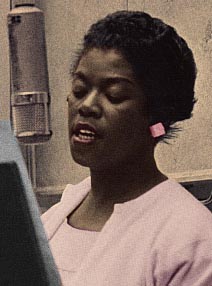
As a personal manager, C.B. Atkins had nowhere near the experience of George Treadwell, whose heavy-handed methods became a burden for other clients like Ruth Brown and long-suffering vocal group The Drifters. Yet with Atkins, Sarah made more money than ever, with yearly collections going into the hundreds of thousands. Sarah was unable to have children; efforts with both husbands had come to naught. In 1961 she and C.B. adopted a newborn baby girl, Deborah Lois Atkins. Little more than a year later, the couple divorced; Sarah cited physical abuse that had begun early and escalated with time. She won custody of the child, who used the Vaughan surname from that point onward. Later, Atkins repeated the pattern when he married another famous singer, Little Esther Phillips.
In 1963, with her contract satisfied, Sarah returned to Mercury. Many of Roulette's artists over the years have alluded to the company's alleged ties to the mob, but anytime Sarah was asked about her experience at Roulette, she said nothing more than to confirm her time there. The second stretch with Mercury yielded well over a hundred recorded songs of varying styles and subject matter more diverse than her earlier, though more highly regarded, period. "A Lover's Concerto," a Johann Sebastian Bach minuet transformed into a pop song by Denny Randell and Sandy Linzer, was the closest she came to a hit single during that time, appearing in spring 1966, several months after the million-selling original version by New York girl group The Toys.
After leaving Mercury again in 1967, Sarah performed for a few years without a record company affiliation, then emerged fresh in the 1970s on the Mainstream label. One minor 1974 hit, "I Need You More (Than Ever Now)," reveals an artist's talent undiminished by the passage of two or more decades. Grammy had passed her by until 1976 (how can that be possible?), when she nabbed her first of seven nominations for the Mainstream album More Sarah Vaughan Live in Japan in the Best Jazz Vocal Performance category. She made records for several other labels in the '70s and '80s, including Pablo (notable jazz artists making up the majority of its roster). In 1981, she performed on a PBS-TV special, Rhapsody and Song: A Tribute to George Gershwin, and won an Emmy for it. A Grammy was added to the top of her TV set (Sarah's alternative to a mantel) when she was honored for Gershwin Live! in the category Best Jazz Vocal Performance, Female, presented to her the evening of February 23, 1983. She received a Lifetime Achievement Grammy in 1989.
A number of men were seen by her side during those years and there was a return trip to the altar, but that marriage in 1978 to another trumpeter, Waymon Reed, unfortunately unfolded in a way similar to the others and ended after three years. In spite of all the turmoil in her life Sarah was, by all accounts, a charming, caring person, humble about the incredible talent she'd been blessed with that everyone could see so clearly whether up close or at a great distance; interviews from later years have revealed a lightly humorous outlook apparently affected little by her disorderly past. Her adopted daughter Deborah, who worked steadily as an actress during the '80s and '90s as Paris Vaughan (she's best known for playing "Nicki" in the 1992 film Buffy the Vampire Slayer), was the real love of her life. The Divine Sarah, so close to the hearts of millions of music lovers, experienced heavy doses of great, good, bad and awful during her 66 years. She passed away at her home on April 3, 1990 while watching a made-for-television movie, Laker Girls, which starred her beloved daughter.
NOTABLE SINGLES:
- Tenderly - 1947
- Nature Boy - 1948
- It's Magic - 1948
- Black Coffee - 1949
- Our Very Own - 1950
- (I Love the Girl) I Love the Guy /
Thinking of You - 1950 - These Things I Offer You (For a Lifetime) - 1951
- Vanity - 1951
- I Ran All the Way Home - 1952
- Make Yourself Comfortable /
Idle Gossip - 1954 - Lullaby of Birdland - 1955
- How Important Can it Be? /
Waltzing Down the Aisle - 1955 - Whatever Lola Wants - 1955
- Experience Unnecessary - 1955
- Johnny, Be Smart - 1955
- C'est La Vie /
Never - 1955 - Mr. Wonderful - 1956
- Hot and Cold Running Tears - 1956
- Fabulous Character /
The Other Woman - 1956 - It Happened Again - 1956
- The Banana Boat Song - 1957
- Leave it to Love - 1957
- Passing Strangers - 1957
by Sarah Vaughan and Billy Eckstine - Please Mr. Brown - 1957
- Separate Ways - 1959
- Broken-Hearted Melody /
Misty - 1959 - Smooth Operator - 1959
- Eternally /
You're My Baby - 1960 - Our Waltz - 1960
- Ooh! What a Day! - 1960
- Serenata - 1960
- Out of This World - 1960
- Sole, Sole, Sole - 1964
- Bluesette - 1964
- A Lover's Concerto - 1966
- 1, 2, 3 - 1966
- I Need You More (Than Ever Now) - 1974


